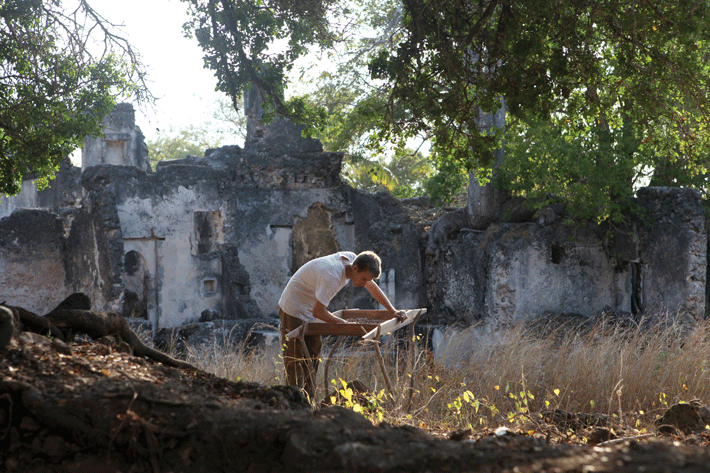Welcome to DU!
The truly grassroots left-of-center political community where regular people, not algorithms, drive the discussions and set the standards.
Join the community:
Create a free account
Support DU (and get rid of ads!):
Become a Star Member
Latest Breaking News
Editorials & Other Articles
General Discussion
The DU Lounge
All Forums
Issue Forums
Culture Forums
Alliance Forums
Region Forums
Support Forums
Help & Search
Anthropology
Related: About this forumArcheologists Are Too Colonial, Says Anthropologist
By News Staff | June 3rd 2019 06:33 AM
In a recent paper, Lehigh University anthropologist Professor Allison Mickel says archaeological excavations are often led by foreigners from the West while dependent on the labor of people from the local community, a relic of Western colonial and imperial pursuits.
Examining some of this history specifically in the context archaeological excavations undertaken in the Middle East, Mickel wrote: "Even well into the 20th century, locally hired excavation workers continued to benefit little from working on archaeological projects, still predominantly directed by European and American researchers who paid extremely low wages and did not share their purpose, progress, hypotheses, or conclusions with local community members."
Archaeologists are exploitative?
Mickel argues that the framework established by the German economist Karl Marx of the capitalist mode of production can be seen in 19th century archaeological work in the Middle East and dutifully quotes the communist proponent; "...the capitalist mode of production leads to workers experiencing a sense of powerlessness and an inability to fulfill the potential of their own skills, expertise, and abilities."
She criticizes Italian archaeologist Giovanni Battista Belzoni's approach to securing and retaining local laborers for his work in Egypt, which began in 1816 and exemplified the conditions of modes of production that led to his workers' "...alienation in the Marxist sense," beginning with how much he paid them. "Monetarily devaluing the archaeological work of native Egyptians in this way engenders an understanding that archaeological labor is quite literally of little worth--one that in Marx's view deeply impacts the self-image of the workers in a production process. Not only were the workers paid next to nothing for performing the manual labor of Belzoni's endeavors, they were also not involved in the conceptualization of the project. In the end, the antiquities were subsequently shipped thousands of miles away, challenging both ideologically and spatially any relationship between the workers and the archaeological objects being unearthed through excavation, as well as the knowledge gleaned from them."
More:
https://www.science20.com/news_staff/archeologists_are_too_colonial_says_anthropologist-238434
3 replies
 = new reply since forum marked as read
Highlight:
NoneDon't highlight anything
5 newestHighlight 5 most recent replies
= new reply since forum marked as read
Highlight:
NoneDon't highlight anything
5 newestHighlight 5 most recent replies
Archeologists Are Too Colonial, Says Anthropologist (Original Post)
Judi Lynn
Jun 2019
OP
JustFiveMoreMinutes
(2,134 posts)1. Maybe they need to get into contact with the Sherpa Union ...
.. to see how to organize themselves and reap the rewards of 'conquest'. ![]()
ellenrr
(3,865 posts)2. Decolonizing Archaeology
The study of archaeology was originated in Europe, therefore its colonial roots are very apparent. Because it originated as colonial practice, in general, archaeology has mainly been westerners traveling and trying to understand the history of different Indigenous people (Indigenous Archaeology as Decolonizing Practice). The fact that the colonizers were the people determining the history of past civilizations reveals that a bias exists in how we understand certain cultures. When artifacts were found and analyzed, they were easily misinterpreted and taken out of context. Then they would be taken and placed in a museum, creating a false history. These inaccuracies are then passed down and are taken for the truth. For example, when British archaeologist Neville Chittick came across ancient stone towns on the Swahili Coast, he automatically assumed that they had to have been made by outsiders (Matters of Context). His misinterpretation was then documented in textbooks and has misguided many people who read his work. In class we discussed the importance of contextualizing artifacts. In order to fully understand the artifact being studied, it is crucial to be conscious and knowledgable about the culture, traditions, rituals and other defining characteristics surrounding it. Without this understanding, artifacts are taken out of context, misunderstood, and the entire truth is not revealed. Archaeology’s colonial roots and prioritization of Western cultures has proved to be problematic, but there are ways to break away from this system.
https://pages.vassar.edu/realarchaeology/2017/09/17/decolonizing-archaeology/
Judi Lynn
(164,038 posts)3. Had never heard of the stone towns on the Swahili coast.
Very sad assessment from Neville Chittick.

Enlargement of the small photo with the article.
Thank you for this link. Looking forward to hearing more about the clearly misrepresented town, too.